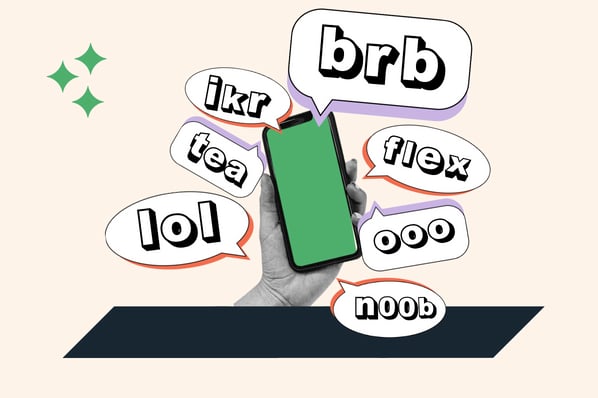Psychology
Internet slang spreads like wildfire and sometimes seems to come out of nowhere. Some are short-lived, some are used in niche communities, but some go so far as to be included in dictionaries. Whether you spend time online as a casual user or a marketer enacting a social media strategy, you want to know what different slang and abbreviations mean. In this post, we’ll discuss how internet slang originates and spreads, define 81 slang words you might come across, and outline what it takes for slang to be added to our dictionaries. Table of Contents Is the internet to Blame? How Slang Spreads on the Internet Internet Slang Around the World Internet Slang Words How New Words Make It Into the Dictionary Is the Internet to Blame? As we spend less time listening to the radio or watching TV and more time online, the latter has the most influence on
Steve Jobs, the iconic co-founder of Apple, was a master of persuasion. His ability to convince billions of people to buy his products at premium prices was no coincidence. While technical innovations and relentless advertising played a role, the true secret to his success lay in the persuasive techniques that he employed. Techniques that anyone can learn and adopt. In this post, I share how Steve Jobs managed to sway the world using simple, yet powerful persuasion strategies that you can apply in your own life. Leveraging the Labor Illusion Effect One of the most effective tactics Steve Jobs used to instill confidence in Apple products was to emphasize the amount of work and effort he put into their development. Take his first keynote back at Apple recorded in 1998. He’s been re-hired as interim CEO. While he was away the company started to fail, revenue fell, and profits dwindled.
MrBeast is a young YouTuber who has amassed an incredible following through non-traditional means. If you combine the subscribers of all his channels, they would rank as the 7th most populated country in the world. His videos have been viewed more than 26 billion times. MrBeast is not just a storyteller — he also translates this attention into revenue. He earned $54 million last year, launched a range of chocolate bars, an apparel brand, and even a fast-food business. He is one of the world’s best marketers, capturing the attention of billions and turning many of them into customers. Let’s explore the psychology behind MrBeast’s success, and how you can use it as a marketer to help grow your own business. The Two Psychological Biases MrBeast Uses to Garner Millions of Views 1. He uses input bias to create hyper-engaging videos that amass millions of views. How did MrBeast, who started
Traditional metrics (like clicks, shares, and scroll times) can tell you a lot about campaign performance, but they can’t measure how customers feel about your brand. That’s where neuromarketing comes in. As a supplement to more standard marketing performance metrics, neuromarketing can help you analyze the emotional response to your campaigns. Neuromarketing tells us what colors, pictures, music, or messages resonate the most with audiences. Your team can use this data to identify customers’ ad preferences. Take a deep dive into how neuromarketing works for popular brands. Let’s turn to P&G for a real-world example of neuromarketing at work. In partnership with marketing firm Dentsu Data Labs, P&G designed an experiment to find mobile ads that emotionally resonated with their audience. During testing, the company worked with Sticky, a webcam eye-tracking tool by Tobii Pro, to measure engagement of on-the-go users. What they found was intriguing — the time spent
Logical fallacies — those logical gaps that invalidate arguments — aren’t always easy to spot. While some come in the form of loud, glaring inconsistencies, others can easily fly under the radar, sneaking into everyday meetings and conversations undetected. Our guide on logical fallacies will help you build better arguments and identify logical missteps. Jump to: What a logical fallacy is Formal vs. informal fallacies Straw man fallacy Correlation/causation fallacy Ad hominem fallacy What is a logical fallacy? Logical fallacies are deceptive or false arguments that may seem stronger than they actually are due to psychological persuasion, but are proven wrong with reasoning and further examination. These mistakes in reasoning typically consist of an argument and a premise that does not support the conclusion. There are two types of fallacies: formal and informal. Formal: Formal fallacies are arguments that have invalid structure, form, or context errors. Informal: Informal fallacies are
Personality tests are a great way to explore different aspects of who you are, and uncover layers you perhaps hadn’t recognized about yourself before. Being truly self-aware is hard — while they might not be always 100% accurate, personality tests work well as a starting point for self-discovery by providing results you might not have concluded on your own. These insights are invaluable for personal and professional growth. When you’ve got some downtime and want to explore aspects of who you are, why you make certain decisions, who you work well with, or get some guidance on potential career paths, take a look at the best free online personality tests we’ve compiled. Free Myers-Brigg Personality Tests Myers-Briggs is a widely respected and popular personality assessment tool — first used in the 1940s, the test was developed by Katharine Cook Briggs and her daughter, Isabel Briggs Myers. Initially inspired by Jung’s…




![hubspot:-how-neuromarketing-can-revolutionize-the-marketing-industry-[+examples]](https://topdeliverability.com/wp-content/uploads/2022/10/18929-hubspot-how-neuromarketing-can-revolutionize-the-marketing-industry-examples.jpg-23keepProtocol)






